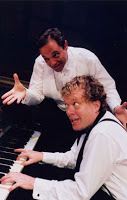 Earlier this year, my husband and I went to see 2 Pianos 4 Hands at the Belfry Theatre here in Victoria. The set was two grand pianos in the middle of the stage. Two actors played a variety of characters, including parents, piano teachers, and the two boys who grow up taking piano lessons, entering piano competitions, and dreaming of fame and glory as great pianists.
Earlier this year, my husband and I went to see 2 Pianos 4 Hands at the Belfry Theatre here in Victoria. The set was two grand pianos in the middle of the stage. Two actors played a variety of characters, including parents, piano teachers, and the two boys who grow up taking piano lessons, entering piano competitions, and dreaming of fame and glory as great pianists.
As I read through the program before the play, one of the playwrights commented that when they first wrote the play, they didn’t expect it to become the smash hit that it did. Who would want to go see a play about pianos, other than former piano students like me? (My husband called it a “nice concert with a bit of dialogue.”)
And yet, somehow, the play has universal appeal. One early viewer said, “It’s not about pianos—its about tennis!” As I thought about it after the show, I would’ve said, “It’s not about pianos—it’s about writing!”
Just as Ted and Richard have to work hard if they wish to achieve their dream of concert pianist stardom, so must writers practice and study to achieve their dream of bestselling author stardom. Unlike young pianists, though, writers likely won’t have a parent hanging over them, making them write when they’d rather be grocery shopping or cleaning house.
Author Larry Brooks says, “I hope nobody told you this fiction writing stuff would be easy. Just like nobody told your local hometown football hero that making an NFL team would be easy, either” (Story Engineering).
Or as Walter Wellesley “Red” Smith said, “There’s nothing to writing. All you do is sit down at a typewriter and open a vein.”
Yes, writing is hard. A good writer’s group can help push you forward as the voice of Ted’s mother encouraged him to keep practicing. A few not-good-enough-drafts are like the practicing Richard did before playing in a local competition. Some writing courses or writing conferences can help in the way that Ted’s piano instructors coached and assisted him. Some great books by fellow writers or authors you admire can inspire you as did the CDs that Richard listened to over and over again.
Unfortunately, 2 Pianos 4 Hands has a sad ending, because Ted and Richard failed to achieve their dreams. At the end of the play, they are left wondering—if they’d practiced harder… if they’d worked longer…
They left me sitting at my computer, writing again. I don’t want to look back on my life and say, “If only I’d written that novel/short story/article instead of just talking about it.”
(Theatre often makes me think about more than just what happened on stage. Another play at the Belfry, Jitters, made me think about what we see “behind the scenes” in theatre, writing, and life!).
in Photo: Ted Dykstra and Richard Greenblatt at the Elgin Theatre, Toronto, 2003. Photo by Robert Bodrog.

No Responses Yet